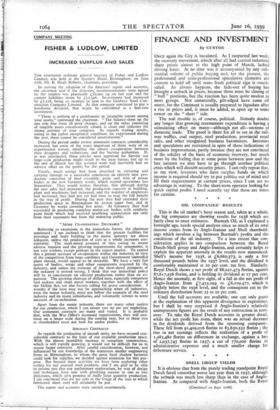SHELL GROUP YIELDS
It is obvious that from the purely trading standpoint Roya. Dutch fared somewhat worse last year than in 1937, although the setback was much less sharp than in the case of Anglo- Iranian. As compared with Anglo-Iranian, both the Royal
(Continued on fiage ro66)
FINANCE AND IN VESTMENT
(Continued from page 1064) Dutch and Shell Transport and Trading have the advantage of a more widely-distributed business from the geographical standpoint, apart from the differences I have already men- tion of drawing a substantial revenue from investments which effectively represents profits made in the preceding year. All the same, I cannot help feeling that there may be some political factor in Anglo-Iranian's profits. It will be surpris- ing, at any rate, if the net figure now shown has not been struck on a more conservative basis than in 1937. Mean- while, let us take a look at some of the leading oil share prices and yields. Here are the four leaders :— Current 1938 Price. Dividend. Yield p.c.
s. d. Rate. £ s. d.
Anglo-Iranian 78 9 .. 20 ... 5 2 3 Burmah Oil 72 6 ... 21 ... 5 16 o Royal Dutch £35i ... 17 ... 5 18 0 Shell 83 9 . . 20* ... 5 10 of * Tax free. t Less tax.
Yields ranging between just over 5 and just under 6 per cent. seem to me to do justice to these companies' shares in current conditions. The returns are similar to those obtainable on many good-class industrial equities where earnings prospects are reasonably favourable, and the company has strong finances and alert man- agement. All these oil companies have powerful pro- ducing and marketing organisations, and all are in a position to do well if conditions give them a chance. So far as can be judged, the immediate outlook in the United States does not hold out a prospect of any rapid or substantial im- provement in oil prices, but equally there is no reason to suppose that the 1939 average will fall below that of 1938. Intensified restriction of output has just been introduced in Texas, stock of crude and refined products are not oppres- sively large, and consumption should benefit from the higher level of economic activity. Shareholders in the leading oil companies have therefore a good case for holding on.























































 Previous page
Previous page